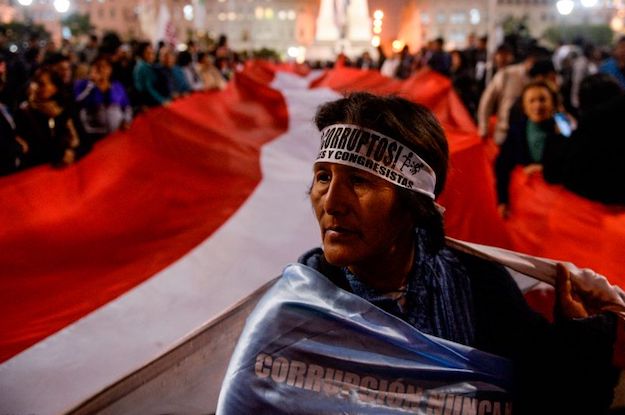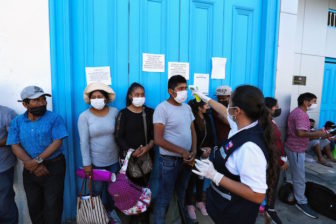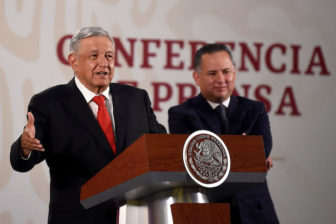Brazil’s Car Wash investigations have become synonymous with corruption busting in Latin America. But they’ve also highlighted a lack of collaboration across the region when it comes to tackling the issue.
Colombian Inspector General Fernando Carrillo told AQ that his efforts to investigate Odebrecht’s activities abroad have been hampered by the fact that evidence against the company has been sealed in Brazil.
Carrillo recently sat down with AQ to discuss how to improve international cooperation in the anti-corruption effort, and why progress is so urgent. The following interview has been edited for clarity and length.
AQ: Are the lessons Colombia learned from fighting drug cartels relevant when it comes to corruption?
Fernando Carrillo: The fight against narcotrafficking in the past is equivalent to the fight against corruption today.
In those days, when we fought the cartels, judges were kept anonymous for their protection. Today the most important tool is an independent judiciary. Latin America has been the perfect theater to politicize justice because politics in the region has become a business, where campaign financing ends up being repaid with public contracts. Most cases of political corruption in Latin America derive from campaign financing.
There are discussions about how to solve this issue, but the one thing that is clear is that the private sector has a responsibility to participate. We can’t deny the possibility of businesses financing campaigns, but it has to be done in the light of day.
There is a big debate throughout Latin America now about new tools against corruption, such as regulations on lobbying and conflict of interest and the idea of instituting corporate criminal responsibility. There exist new forms of corruption that are a lot more sophisticated than in the past, and we need to respond with adequate tools and policies at the local and international levels.
Other crucial components are a free and independent press and engagement from the private sector and civil society. As they say in Argentina, it takes two to tango, and in most cases it’s not a public servant who bribes another public servant.
AQ: What is the current level of international cooperation in anti-corruption initiatives?
Carrillo: We are lacking an international policy against corruption that can bring together all Latin American countries.
One of the main challenges we have today is that a number of international tools and treaties are paralyzed. Corruption in the region is a transnational organized crime operation, on top of the domestic cases happening in our countries. The Organization of American States needs to have a role again. The monitoring mechanisms of the Inter-American Convention Against Corruption, which are sort of frozen at the moment, need to be restarted.
The fundamental issue right now is judicial cooperation against corruption, which is not working. There are informal accords, there are relationships between individuals in law enforcement, in prosecutors’ offices, but we need state level relationships. When Colombia asked the previous government in Brazil to share intelligence, they weren’t interested in having the evidence released and judicial cooperation hit a bottleneck.
The case of Venezuela is a dramatic example. No one knows how much Odebrecht paid in bribes to Hugo Chávez and Nicolás Maduro. There are reports that they received somewhere in the hundreds of millions of dollars, and that information would definitely be on the Odebrecht books in Brazilian courts’ possession. The fall of many corrupt leaders in Latin America has happened when their populations learned that they were stealing from the public, enriching themselves at their cost. That is what toppled Augusto Pinochet and Alberto Fujimori. I am sure that if we were to show Venezuelans what Maduro has received in these international operations, things could change.
AQ: What are the tools you advocate?
Carrillo: You have to impose three types of sanctions: legal sanctions, moral sanctions and social sanctions.
People have learned to tolerate corruption. We have to combat this tolerance. These three sides, the legal, the social and the moral, have to converge for this to work. And there is a pragmatic reason for this: In Latin America corruption costs us 5% of GDP, and nothing weakens public confidence more than corruption.
In health care systems throughout Latin America, for example, there is generalized corruption. In Colombia we’ve been fighting mafias that are taking over childhood nutrition programs for the poor. There is a tight connection between corruption and the violation of fundamental rights of the citizens. That is why civil society cannot stay indifferent to the fight against corruption, much less tolerate it.
In Colombia after 50 years of conflict, corruption showed up – we say that the fog of war didn’t let us see the corruption that was there. That is why this phenomenon surfaced. We are fighting with our institutions, using legal tools, but there is a need for civil society to act. An active civil society that protects public interests and an independent media free from political forces, as well as a committed private sector – these are the fundamental guarantees for the fight against corruption to succeed.
—
Tornaghi is the managing editor at AQ








